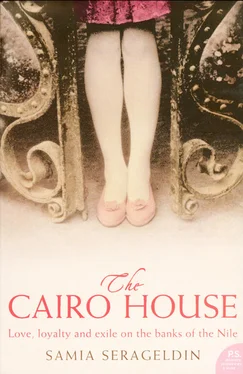I took the bobby pins out of my mouth and slowly secured a twisted braid in place. ‘I wonder what happens, when they sacrifice the sheep, I mean. It would be interesting to watch, just one time, what do you think?’
‘ Quelle horreur, ’ Madame Hélène shuddered. ‘Don’t even think about it. Your mother would never allow it.’
‘Oh, it was just a thought.’ I slipped one last pin in her hair. ‘There, your chignon is done, you look like the Belle Hélène of the Greeks.’
That was not strictly true. Madame Hélène had big, bulging blue eyes, rather like boiled eggs, which I attributed to much weeping. She had told me all about her sad life. A Frenchwoman married to an expatriate Italian count with considerable property in Egypt, they had been dispossessed by the British during the Second World War. Her husband’s death had left her penniless and childless. She had been reduced to working as a governess for a living, although among her coterie of expatriate widows she only admitted to giving private lessons. She kept a small apartment in downtown Cairo, where she spent her days off. She had no close relatives left in Europe, but was very attached to a godson who lived near Lyons. She often talked about ‘ le petit Luc, ’, and wrote him letters. She kept a photo of him on the table next to her armchair in my bedroom: a photo of a boy with a thick thatch of blonde-streaked hair over a square, smiling face.
‘That photo is at least ten years old,’ Madame Hélène would sigh as she looked at the photograph every day. ‘He must be eight or nine years older than you, ma petite, I can’t remember exactly.’
I sat down and flipped through a book, but I could not keep my mind on the pages. I had never been particularly curious about the ritual of the sacrifice. By the time I woke up on Feast Day mornings, it was all over. It was over by the time my father was roused, at about six o’clock, to attend the early prayers. Even Muslims who rarely set foot in a mosque during the year attend the feast prayers, and, on these occasions, the carpeting is extended out into the courtyard of the mosque in anticipation of the overflow. Papa tended to be late, so he usually ended up in the courtyard, along with the cook and his helpers, who would also arrive late and exhausted, having just finished with the butchering.
Mama, who normally rose at about ten o’clock, would have been up at dawn, supervising the distribution of meat to the old retainers and the poor who regularly came to the house. A small crowd would have gathered by daybreak. The wetnurses were given the lion’s share, followed by the household help. The sheepskins invariably fell to the lot of the Nubian doorkeeper, who took them back with him to his village in the Nubia on his biannual visits home.
I would stay up in my room until it was time for me to dress and go with Papa on another round of visits. By the time I came home, calm would have been restored, and the people who had come for charity would have dispersed. Dinner would be served, with several dishes of lamb as required by tradition. I never touched it; the odor of freshly-butchered meat still lingered about the kitchen, wafting into the dining-room every time the door to the butler’s pantry swung open. The household staff would be in a hurry to clear the table and be gone for the holidays, except for the governess, who did not celebrate Muslim feasts, and for the doorkeeper, who had no family in Cairo.
It had never before occurred to me to be curious about what went on in that shed, between dawn and daybreak. But now I could not get the idea out of my head, not even when Papa took me with him on the first round of visits to relatives. The routine never varied; the aunts and uncles were visited in order of their seniority. Since Papa was the youngest of his eight brothers and sisters, his turn to receive visitors came on the last of the three days of the Feast. On the Eve of the Feast he took me to visit the Pasha, Papa’s oldest brother and the head of the clan. He lived in the family home in Garden City, which everyone called the Cairo House.
On the way we passed a truck full of smiling, excited people from the country. They were standing up in the back of the truck, swaying with its movement, singing and clapping. The girls wore neon pink, nylon gauze dresses, the boys new striped pajamas. We also passed pick-up trucks carrying bleating sheep marked for slaughter with a rose-red stain on their fat tails. By dawn the next day they would all be butchered. I stared at them with equal fascination and revulsion, trying to imagine the actual proceedings.
We drove down the Nile Corniche past the grand hotels and the long white wall of the British Embassy, then turned off into the narrow, villa-lined streets of Garden City. When we reached the family house Papa stopped the car and honked for the gatekeeper to open the gate. He parked in the back of the villa, alongside several other cars.
I followed him round to the front, past the fountain with its statue of a reclining Poseidon. One of the two heavy double doors was open; normally the front doors were only used on feast days, and at weddings and funerals. Inside the long hall the marble floor radiated cold. I looked up through the atrium at the blazing crystal chandelier suspended from the ceiling of the second floor, fifty feet above my head.
‘Let’s go upstairs to see your grandmother first.’ Papa headed for the wide marble staircase with the two curved balustrades. I followed him up, then along the gallery.
At the top of the stairs we were met by Fangali, the majordomo of the house. He adjusted the out-moded fez he wore on his head and tugged at his caftan as he came forward to greet us. There was something about him that eluded my understanding. The high-pitched voice, the ingratiating manner, contrasted with the thin moustache, the bold eyes. I wondered why he, of all the menservants, was the only one allowed to come and go freely upstairs, in the family quarters. I had vaguely overheard that, as a result of an accident at birth, he was not quite a man. I wondered if he was an agha. I had heard of the eunuches of my grandmother’s day, without understanding what the word signified. I didn’t dare ask. Years later I thought I understood, but later still, Fangali would spring a surprise on us all.
Fangali knocked perfunctorily on the door to Grandmother’s room and opened it, announcing in his peculiar whine: ‘Look who’s here, Hanem. Shamel Bey and Sitt Gigi.’
Grandmother was sitting on a chaise longue, her legs covered with a knit shawl. Fangali tucked the shawl around the child-like feet in satin mules, and left the room. It never failed to amaze me that this tiny woman could have born my tall, strapping father and his eight brothers and sisters. But it seemed as though the effort had drained Grandmother completely; as far back as I could remember, she had always had that vague air of detachment about her.
Papa kissed his mother’s hand and pulled up a chair beside her and I followed suit. She was saying to Papa, with an approving nod in my direction, ‘That little one can name her own mahr. ’ I understood vaguely what the word meant: the dowry the bridegroom brings to the bride.
Papa laughed and rumpled my hair. ‘I’m going down to see your uncle in his study, Gigi. I’ll send for you when I’m ready to go, and you can come to wish him a happy Feast before we leave.’
I nodded and sat down beside Grandmother. Fangali brought us glasses of qammar-eddin, apricot nectar, and a tray with sweets. I nibbled absently on a glacé chestnut, my mind on the act of the Sacrifice. Mama would never allow it if I asked to observe it, but she had never expressly forbade it, so technically I would not be disobeying. I knew Mama’s rules well enough though: whatever was not explicitly allowed was forbidden. As for Madame Hélène, she slept in the room adjoining mine, with the door ajar, but she slept heavily, with a smoker’s nasal snore. I made up my mind: I would do it.
Читать дальше











